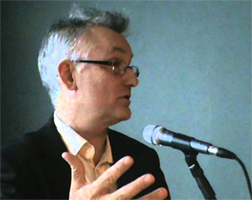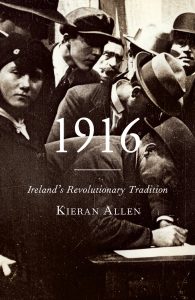Kieran Allen is a member of People Before Profit in Ire land and a sociologist at University College Dublin. He has written about radical politics in the context of Europe
land and a sociologist at University College Dublin. He has written about radical politics in the context of Europe , including seven single-authored books. His most recent book, Ireland’s Revolutionary Tradition (2016) brings the radical tradition back into the history of the Easter Uprising and shows how this tradition endures and challenges elitist politics today.
, including seven single-authored books. His most recent book, Ireland’s Revolutionary Tradition (2016) brings the radical tradition back into the history of the Easter Uprising and shows how this tradition endures and challenges elitist politics today.
"Radical Left Strategies Today"
Keynote Address: Kieran Allen
Chair: Ann Withorn
Animator: Lesley Wood
Tuesday, May 2, 2017, in the Verney Room, 6th Floor Ross (674), 15:15-17:00.
A reception honouring community participants and graduate students will follow.
__________________________________________________________________________
Abstract
The ‘extreme centre’ that dominates conventional politics is weakening. A political polarisation to the left and the right is occurring. The scale varies but the potential for a significant expansion of the left exists in most countries. This requires a re-orientation. The strategy of winning a majority in parliament and using current state apparatus has failed. The experience of Syriza bears testimony to this. Currently a growing number of working people want a ‘government that cares’ but this aspiration cannot be realised within the confines of capitalism. A political journey through struggle, electoral activity and participation in parliament is required but a successful outcome requires the uprooting of the present system.
Anti-capitalists need to connect to the day to day realities of working class life. Neo-liberalism, or turbo charged capitalism, has intruded into almost every area of society. This makes it possible to mobilise campaigns of ‘people power’ in opposition in many arenas. Such mobilisation brings a re-politicisation and helps create favourable conditions for a return to ‘workers power’. Anti-capitalists need to break from a culture of despondency, political sectarianism and seeing themselves as a marginalised commentariat. They need to use language and symbols that furthers struggle. They should use the full array of social media tools. They should avoid pre-determined templates for how struggles should be conducted. They should recognise that socialism is not an intellectual doctrine but an expression of a real movement of working people.
In many cases this will involve transitional forms of political organisation. These provide a space where anti-capitalists can work jointly with reform minded activists to fight for working class aspirations. Such transitional spaces are necessary because the traditional networks of both social democracy and communism have decayed. Within a context of collective struggle and open debate on concrete issues a successful left can be forged.
Chair
Ann Withorn has been a close observer and ally to several radical movements in the United States since the late 1960s, especially concerning welfare rights, women's rights, and racial and economic justice. She has published extensively on such topics and from 1977 to 2013 taught social movement history and theory at the College of Public and Community Service at UMass. Currently, she is working on a book that draws upon her more than forty years of formal and informal radical teaching, entitled Who Did We Think We Were: Radical Higher Education and the Neoliberal Imperative. For more information see: www.radicalreentry.com.
Animator
Lesley Wood is interested in how ideas travel, how power operates, how institutions change, how conversations influence practices, how people resist and how conflict starts, transforms and ends. She is the author of Direct Action, Deliberation and Diffusion (2012) and Crisis and Control: The Militarization of Protest Policing (2014). She is Associate Professor of Sociology at York, a regional editor for Interface: A Journal for and about Social Movements, and is active in the anti-poverty and global justice movements.

